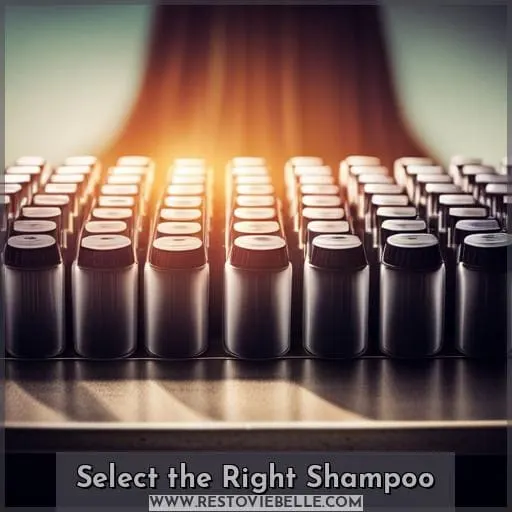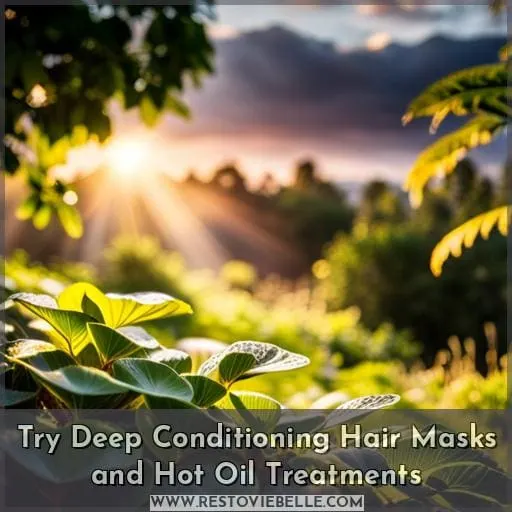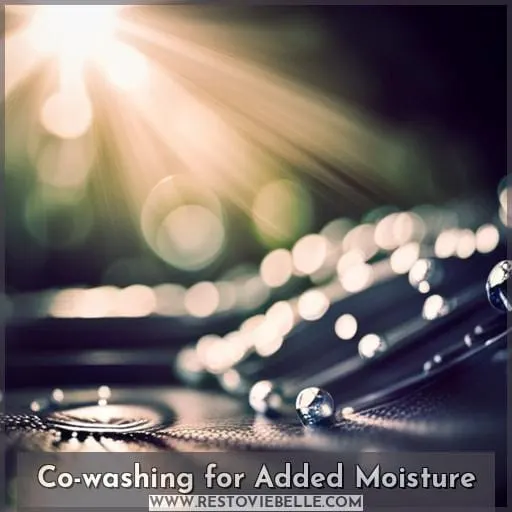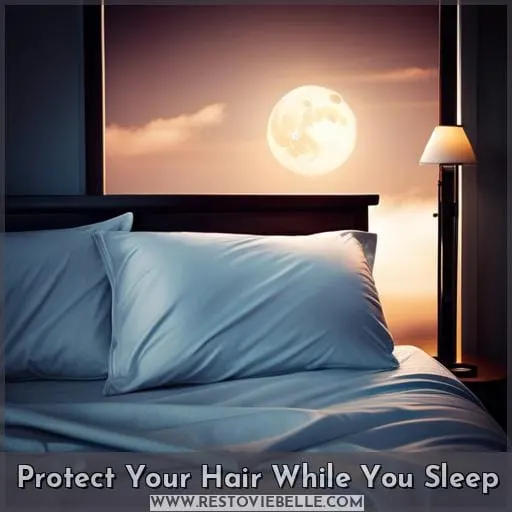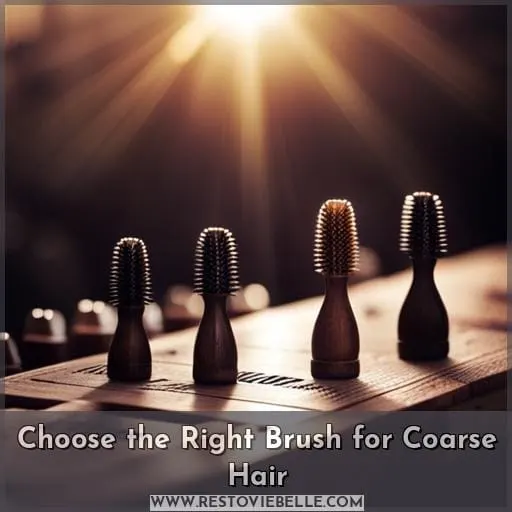This site is supported by our readers. We may earn a commission, at no cost to you, if you purchase through links.
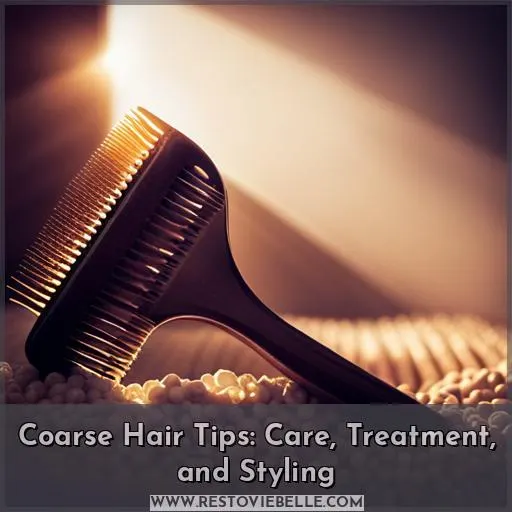 Tired of dealing with unruly, dry, and frizzy hair? Look no further! We’ve got you covered with our expert tips on caring for your coarse hair.
Tired of dealing with unruly, dry, and frizzy hair? Look no further! We’ve got you covered with our expert tips on caring for your coarse hair.
From choosing the right shampoo to protecting your strands while you sleep, we’ll help you achieve healthy and beautiful tresses.
Get ready to embrace the power of proper care, treatment, and styling for your coarse hair type!
Table Of Contents
- Key Takeaways
- Select the Right Shampoo
- Try Deep Conditioning Hair Masks and Hot Oil Treatments
- Co-washing for Added Moisture
- Nourish Your Hair From the Inside Out
- Protect Your Hair While You Sleep
- Limit Heat Styling and Harsh Chemicals
- Choose the Right Brush for Coarse Hair
- Regularly Trim Your Hair to Prevent Split Ends
- Frequently Asked Questions (FAQs)
- What are the common causes of coarse hair?
- Can coarse hair be changed or altered through hair care products or treatments?
- How often should I use deep conditioning hair masks and hot oil treatments for coarse hair?
- Are there any specific vitamins or nutrients that are particularly beneficial for coarse hair?
- What are some alternative hairstyles or protective styles that can help minimize damage and breakage in coarse hair?
- Conclusion
Key Takeaways
- Opt for moisturizing and sulfate-free shampoos.
- Incorporate deep conditioning masks weekly for intense hydration.
- Emphasize a nutrient-rich diet for healthy hair.
- Limit heat styling and harsh chemical treatments for healthier hair.
Select the Right Shampoo
When it comes to caring for your coarse hair, selecting the right shampoo is crucial.
Look for moisturizing shampoos that are free of parabens and sulfates to help maintain strand integrity and hydration.
Additionally, co-washing with conditioner instead of shampoo can provide added moisture.
Lastly, opt for alcohol-free product options to prevent further drying out of your hair strands.
Best moisturizing shampoos
Looking for a moisturizing shampoo that will nourish and hydrate your coarse hair? Look no further.
When selecting the right shampoo, opt for ones with moisturizing ingredients like natural oils to promote hydration and improve scalp health.
Incorporating these hydration techniques into your hair care routine is essential for maintaining healthy-looking coarse hair.
Co-washing for added moisture
To add moisture and nourishment to your coarse hair, consider co-washing with a moisturizing conditioner instead of using traditional shampoo.
Co-washing benefits include:
- Helping with moisture retention
- Promoting scalp health
- Providing hydration to dry strands
Contrary to misconceptions, co-washing doesn’t leave the hair greasy or dirty. It’s an effective technique for maintaining the natural oils in coarse hair while still keeping it clean and hydrated.
Alcohol-free product options
When opting for alcohol-free styling products, you’ll prevent moisture loss while achieving your desired look.
Choose a shampoo that prioritizes ingredient selection and avoids harsh chemicals like parabens and sulfates. These chemicals can strip the hair of its natural oils, leading to dryness and damage.
By selecting an alcohol-free shampoo, you’ll not only protect your hair health but also minimize environmental impact without compromising on effective cleansing and nourishment for your coarse hair.
Try Deep Conditioning Hair Masks and Hot Oil Treatments
Try Deep Conditioning Hair Masks and Hot Oil Treatments
To deeply nourish and hydrate your coarse hair, try incorporating regular deep conditioning hair masks and hot oil treatments into your routine. These restorative treatments provide deep hydration to repair damage and promote overall hair health.
Look for masks and oils with natural ingredients like shea butter, coconut oil, olive oil, avocado, honey, and eggs. The nourishing properties of these ingredients can penetrate deep within the hair cuticle to inject moisture.
Apply a hair mask 1-2 times per week by liberally coating damp hair. Allow it to soak in for 30+ minutes before rinsing. For hot oil treatments, warm up a hair-healthy oil and massage it into your dry strands.
Over time, these intensive conditioning treatments can radically improve the health of coarse hair. The strands become smoother, softer, and more manageable. Consistency is key, so commit to a weekly deep conditioning routine.
Your hair will thank you through enhanced shine, vitality and less breakage over time.
Co-washing for Added Moisture
For added moisture and hydration, co-washing is a beneficial practice for coarse hair. This technique involves cleansing hair with conditioner instead of shampoo to infuse hydration while avoiding stripping oils.
Benefits of co-washing:
- Allows conditioner to penetrate shaft rather than simply coating strands
- Nourishes with emollients as cleansing occurs
- Leaves hair soft, manageable, and frizz-free
- Promotes curl definition
When co-washing, massage conditioner thoroughly into scalp and lengths before rinsing clean. Rotate your choice of conditioner to allow ingredients to fully nourish strands.
This simple swap hydrates hair that craves moisture. With this cleansing method, hair maintains its natural oils and enjoys lasting softness between washes. Implement a cowashing practice and witness the hair-transforming effects firsthand.
Nourish Your Hair From the Inside Out
To achieve healthy and vibrant coarse hair, it’s essential to nourish your locks from the inside out.
Nutrient-rich diets play a crucial role in promoting overall hair health and texture. It’s important to understand that what you eat can have a significant impact on the condition of your hair. A well-balanced diet that includes vitamins, minerals, and antioxidants helps provide the necessary nutrients for strong and resilient strands.
Hydration benefits not only your body but also your hair. Drinking an adequate amount of water keeps your scalp hydrated, which is essential for maintaining healthy follicles.
Environmental influences such as pollution, sun exposure, and harsh weather conditions can take a toll on coarse hair.
and whole grains rich in vitamins A,C,D,E , iron,nicacin,and biotin,you are arming yourself with natural defense against these external factors.
Hormonal impacts may affect how our bodies produce sebum (the natural oil produced by our scalps), leading to dryness or excessive oiliness.These hormones play vital roles in regulating various bodily functions including Hair growth so ensuring hormonal balance through proper nutrition is key
By adopting nutrient-rich diets filled with wholesome foods,such as chia seeds,walnuts ,spinach,tomatoes,and coconut oil,you will be providing optimal nourishment for healthier,stronger Coarse Hair.
Protect Your Hair While You Sleep
While you sleep, it’s important to protect your coarse hair from potential damage and maintain its health. Incorporating protective measures into your nighttime routine can make a significant difference in the overall condition of your hair.
One effective way to safeguard your strands is by using silk pillowcases. Unlike cotton or other materials, silk creates less friction against the hair, reducing tangles and breakage caused by tossing and turning during sleep.
Another option for protecting coarse hair while you snooze is through hair wrapping or using a sleep cap. Hair wrapping involves gently tying up your tresses with a satin scarf or bonnet before bed to help retain moisture and prevent frizz.
Sleep caps made from satin or silk can also provide similar benefits by keeping the hair contained while minimizing friction.
In addition to using silk pillowcases or wraps, incorporating night care products like leave-in conditioners or overnight masks into your bedtime routine can nourish and hydrate coarse strands as you rest.
These treatments work throughout the night to restore moisture levels, repair damage, promote healthy growth, and improve manageability.
By implementing these simple yet effective strategies for protecting coarse hair while you sleep, you’ll wake up with healthier-looking locks that are better equipped to withstand daily styling challenges.
Limit Heat Styling and Harsh Chemicals
When it comes to caring for your coarse hair, you’ll be doing yourself a favor by steering clear of excessive heat styling and harsh chemicals.
These practices can lead to significant damage and compromise the overall health of your hair. Heat styling tools like flat irons, curling wands, and blow dryers can strip moisture from your strands, making them more prone to breakage and frizz.
Additionally, exposure to harsh chemicals found in some hair products can further exacerbate these issues.
To protect your coarse hair from heat damage and chemical exposure, consider incorporating protective hairstyles that minimize the need for daily heat styling. Styles such as braids or buns not only shield your natural texture but also allow for better moisture retention.
Furthermore, focus on implementing proper moisturizing techniques into your regular hair care routine. Deep conditioning treatments with nourishing ingredients will help restore moisture levels in chemically exposed or heat-damaged strands.
Lastly,
exploring natural styling techniques such as air drying or diffusing instead of using high temperatures will contribute to preserving the integrity of
your beautiful coarse locks.
Remember that opting for gentler methods when it comes
to hairstyling is key in maintaining healthy-looking tresses.
Choose the Right Brush for Coarse Hair
When it comes to choosing the right brush for your coarse hair, there are a few factors to consider.
First, opt for brushes with wide-toothed combs or rounded-tip bristles that can easily glide through your strands without causing breakage.
Nylon bristle brushes are also a great option as they help distribute natural oils and stimulate the scalp.
By selecting the right brush, you can prevent damage and maintain healthy, manageable coarse hair.
Best brushes for coarse hair
Looking for the best brush to tame your coarse hair? Choose the right brush for optimal results.
- Wide-toothed combs: These help detangle without causing breakage.
- Rounded-tip brushes: They gently massage the scalp, stimulating circulation.
- Nylon bristle brushes: These are effective at distributing natural oils throughout the hair, promoting shine and reducing frizz.
- Boar Bristle Hairbrushes: Ideal for detangling and smoothing coarse hair while stimulating scalp stimulation.
Additional brushing techniques:
- Start from ends to roots to prevent tugging on knots or snags
- Use gentle strokes instead of harsh brushing motions
- Divide your hair into sections for easier handling
Scalp Stimulation:
- Brushing stimulates blood flow in the scalp, promoting healthier follicles and potentially faster growth
Hair Detangling:
- Begin by combing through any large knots or tangles with a wide-toothed comb before using a brush
Natural Oils:
- Brushing helps distribute natural oils produced by your scalp throughout each strand, preventing dryness
Stimulating Circulation:
- Massaging movements when brushing can improve blood circulation in the scalp area
Brushing techniques for coarse hair
To properly care for your coarse hair, it’s important to brush with a brush that’s specifically designed for coarse hair types.
Choose a wide-toothed comb, rounded-tip brush, or nylon bristle brush to prevent breakage.
When brushing, start from the ends and work your way up to detangle knots gently.
Brushing not only helps with styling but also stimulates the scalp and distributes natural oils for healthier-looking hair.
How to prevent breakage
Choose the right brush to prevent breakage and keep your coarse hair healthy and strong.
Strengthening strands is crucial in repairing damage and promoting overall hair health.
When selecting a brush for coarse hair, opt for wide-toothed combs or brushes with rounded tips and nylon bristles.
These options help minimize breakage by gently detangling knots without causing unnecessary stress or friction on the strands.
Incorporating proper brushing techniques into your routine can significantly improve the condition of your coarse hair, preventing further damage while maintaining its strength and integrity.
Regularly Trim Your Hair to Prevent Split Ends
To maintain the health and prevent split ends, regularly trim your coarse hair every 8-10 weeks.
This regular trimming is key for retaining length by getting rid of damaged, split ends before they travel up the hair shaft.
Schedule trims with your stylist, asking them to assess your ends under a microscope to determine the optimal intervals for your hair.
For proper trimming techniques, have them cut hair when it’s dry using sharp shears in a dust-free environment.
Allow your stylist to decide how much to trim based on the health of your ends – resist urging them to trim less to retain length, as this can backfire.
Stay hydrated in between trims, incorporating masks and limiting heat styling.
Ultimately a little length loss with each trim will pay off for longer, stronger strands.
Discuss customized trim schedules with your stylist during each appointment to promote hair vitality through strategic trimming.
Frequently Asked Questions (FAQs)
What are the common causes of coarse hair?
Coarse hair can result from:
- Genetic predisposition
- Medical conditions like hypothyroidism
- Nutrient deficiencies
- Hormonal changes
- Certain medications
- Heat styling damage
- Harsh chemicals
- Aging
Analyzing width, feel, texture, and curl pattern helps determine if your strands are truly coarse or just appear so from other factors.
Can coarse hair be changed or altered through hair care products or treatments?
Yes, the proper hair care regimen can help improve the quality and manageability of coarse hair.
Focus on moisture-infusing and smoothing products.
Treatment options like keratin smoothing and deep conditioning masks also help coarse strands feel softer, smoother, and more vibrant.
Consistent nourishment is key.
How often should I use deep conditioning hair masks and hot oil treatments for coarse hair?
To effectively nourish and hydrate your coarse hair, incorporate deep conditioning masks with rich ingredients once or twice a week.
Additionally, consider using hot oil treatments weekly to seal the cuticle and reduce frizz for optimal hair health and manageability.
Are there any specific vitamins or nutrients that are particularly beneficial for coarse hair?
Yes, vitamins A, C, D, E, iron, zinc, and biotin are especially beneficial for coarse hair health.
They strengthen strands, stimulate growth, and provide deep nourishment.
Focus on nutrient-dense whole foods or supplements to obtain enough.
What are some alternative hairstyles or protective styles that can help minimize damage and breakage in coarse hair?
Consider protective styles like braids, twists, or sew-ins, which keep hair contained and minimize environmental damage.
When air drying, use a microfiber towel or t-shirt instead of terry cloth to gently soak moisture while preventing extra breakage.
Conclusion
Achieving healthy and manageable coarse hair is easier than you think! By following these expert tips on caring for your hair type, you can say goodbye to unruly, dry, and frizzy locks.
From selecting the right shampoo and deep conditioning treatments to protecting your strands while you sleep, these tips will help you transform your coarse hair into gorgeous tresses.
Embrace the power of proper care, treatment, and styling, and say hello to beautiful and vibrant hair that you’ll love.

